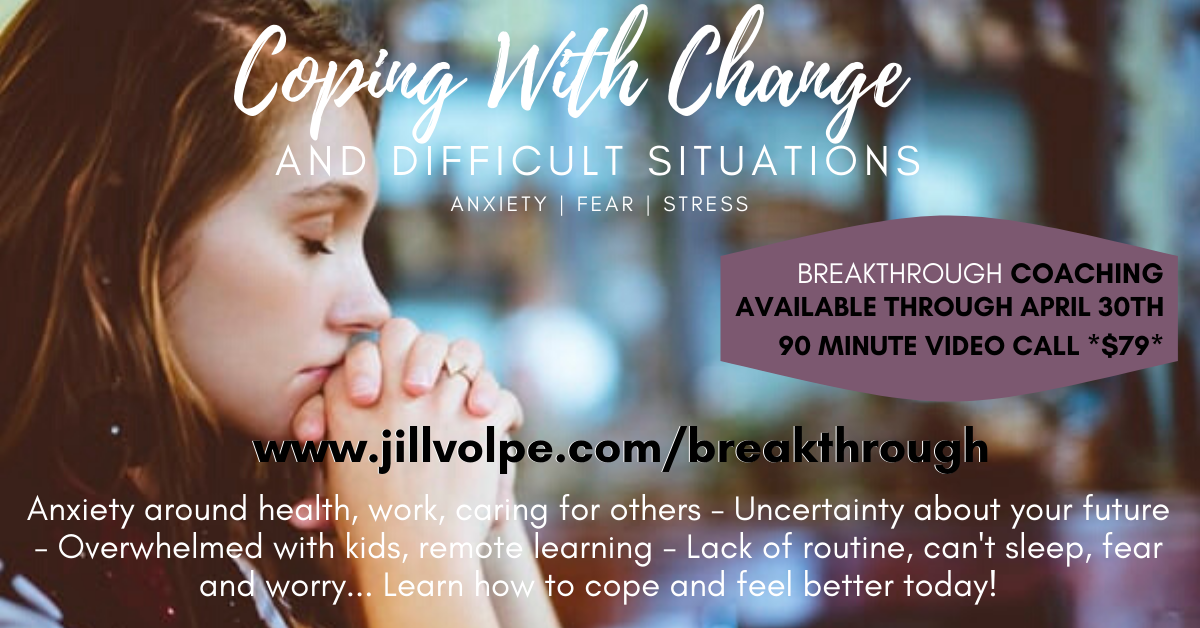During this challenging time…
During this unprecedented time…
During this uncertain time…
Whether we’re referring to the Coronavirus or any other big event, managing our FOTU, “fear of the unknown” can be very difficult. If you suffer from a fear of uncertainty, understanding what fear is, and how it affects you, is often the first step toward regaining your balance and inner peace.
Fear has been defined in several ways; however, the most basic definition of fear is an emotional response based on the fact that we’re faced with something unfamiliar or an impending danger.
When we experience fear, several psychological and physiological responses take place all at the same time.
Psychological events include feeling emotionally overwhelmed, having high levels of anxiety, confusion, and even feeling terrified. Physiological responses include a faster heart rate, shallow breathing, sweating, a loss of appetite, and similar effects.
Experiencing fear can greatly impact your view on life, your confidence level, and even the potential that you have as an individual. It can negatively affect your relationships, your reasoning ability, and your immune system.
Though not related to the virus, here’s a very common scenario of a woman who had a crippling fear of failure:
Janice was very successful in her career and personal life. It seemed that people were instantly drawn to her and her ideas, but on the inside, Janice was a mess.
Every time she worked on a project, she would throw herself into it. In the end, she would ultimately succeed, but on the inside, she was always worried that she would fail or that her completed project wouldn’t be good enough.
At home, Janice felt she had to be the perfect wife and mother and in doing so she gave everything to everyone else for fear that if she didn’t, others would judge her.
For the most part, Janice recognized the fact that her fear was irrational. However, she grew up in an “abusive” home. She wasn’t physically beaten but she was consistently ridiculed by her father. Regardless of what she did, it was never enough to meet his expectations.
The result was that she grew up to become a workaholic, often struggling to finish several things at once, had impossibly high standards for her family and little time for the things she enjoyed.
The root of her fear of failure was grounded in her childhood. Her father harbored unrealistically high expectations and would be mentally abusive towards her when his expectations weren’t met. Once she realized this about her past, Janice was able to ease her personal expectations, become more accepting of herself, and overcome her fear.
Through coaching, Janice got in touch with her core values, developed confidence and trust in herself – her true Self. From her new identity, she began to modify her habits, her communication skills, and her relationships so that everything lined up and positively reinforced the woman she really wanted to be in the world.
Here are some strategies you can use to help overcome your fear:
- Recognize your fears. By realizing that you’re fearful, you’re more likely to get to the bottom of what the fear is.
- You may also have a fear of facing your fears. One of the simplest ways to overcome this is to take a moment to realize the impact or consequences that having this fear has had on your life so far.How is it limiting your happiness, the depth of your relationships, or your desire to go after a dream you’ve always had? What are you modeling to your children? What gift or talent are you holding back from the world?These questions aren’t meant to make you feel bad. They are meant, instead, to wake you up.
- You might come to understand that you’re afraid of failing or taking chances. You may even be fearful because you simply don’t have confidence in yourself. And you may be fearful because you don’t have control over the outcome. Fear of the unknown is very prevalent now as our nation and local communities deal with the Coronavirus.
- Regardless of the issue at hand, it’s important that you recognize your fear and attempt to define what it is that makes you terrified of the unknown. The key here is not to dwell on your fear, but rather to understand precisely what it is you’re worried about.
- Determine the underlying root of your fears. How can you identify the cause of your fears? An insightful look at your life might reveal the answer. By recognizing what causes your fears, it’s likely you can manage them with great success.
- Face your fears. Once you’ve accepted your fear and identified the root cause, The next step is all about taking action.
- Make a decision to purposely tackle your fears by engaging in activities that challenge and push you outside of your comfort zone. For example, put yourself in a place where you’re safe yet slightly uncomfortable, or respectfully confront someone from your past to make amends. Depending on what the fear is, sometimes just learning to accept that ‘everything happens to help you grow and evolve’ can bring you peace of mind.
- Try shifting your focus, physiology and language. If for example, you’re afraid of catching the Coronavirus or afraid of what will be economically after the pandemic, try shifting your focus toward gratitude for what you do know and what you do have right now.Be thankful that we have technology so that we can easily keep in touch with family and friends while everything is shut down. Be thankful that it’s springtime and you can go outside and enjoy a walk or gardening. Be mindful of your physiology, habits, and routines. Try to keep the same schedule you have normally, continue exercising, getting up at the same time every day, eating well and stimulating your mind. And watch the words you use to describe events and yourself. Feed your body, mind and spirit positivity, faith, and gratitude.
- EXPERT TIP: Ask yourself this question: “What is more important than this (name the fear)?” When you have your answer, try going deeper by asking yourself, “What is even more important then that?” Continue asking yourself this question until you know you have reached the most important factor. This is a great way to get in touch with what you’re heart really needs to feel at peace.
Overcoming your fear of the unknown is a difficult undertaking. However, if you take the time to explore these three steps, you’ll discover a renewed peace and happiness within your heart. And we can all use a little bit more of that right now!
If you need help, please reach out to me or any Mental Health Professional. These are difficult times but let’s remember that we’re all in this together – whether it’s dealing with the emotions that rise up from all the conflicting information, the loss of our “normal” with work and kids, or the loss of sleep because you’re worrying about the health and well being of your loved ones.
We’re all feeling it but you don’t have to feel it alone. Talk to someone or talk to me at www.jillvolpe.com/breakthrough
Be well, be safe, and be at peace



